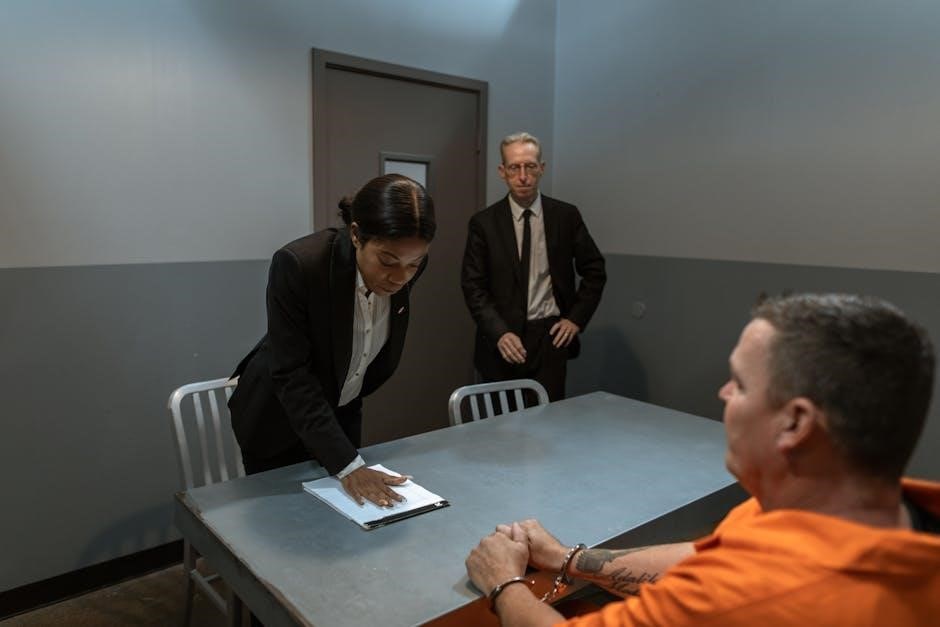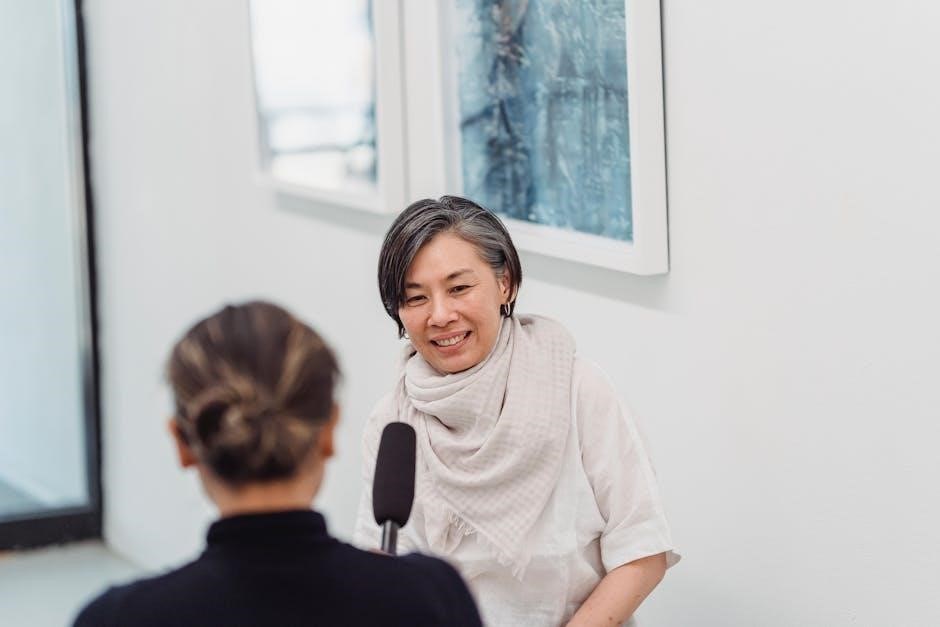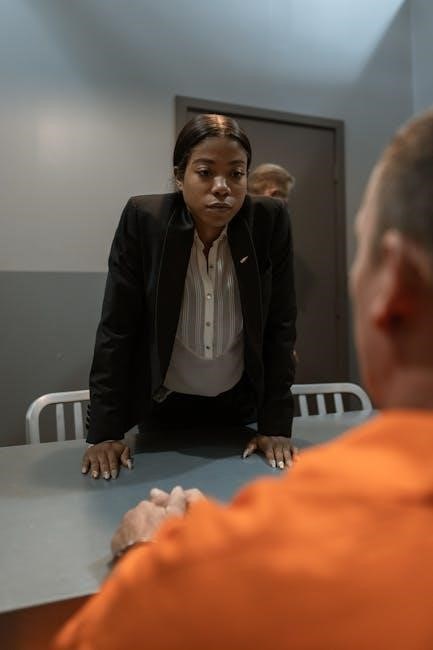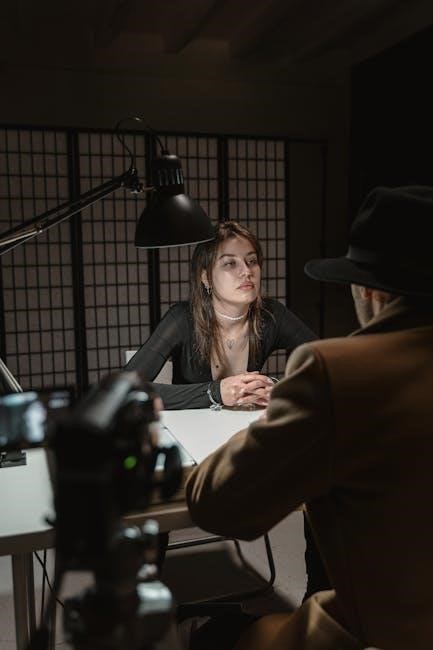Oral history is a powerful method of preserving memories through recorded interviews‚ capturing personal experiences and perspectives. It provides unique insights into historical events and cultural heritage‚ offering a human-centered approach to understanding the past. This section introduces the concept of oral history and its significance in documenting lived experiences‚ setting the foundation for exploring oral history interview questions in-depth.
1.1 What is Oral History?
Oral history is a research method that involves recording and preserving personal recollections of individuals about their experiences‚ traditions‚ and historical events. It captures unique‚ firsthand accounts that might otherwise go unrecorded‚ offering insights into social‚ cultural‚ and political contexts. Unlike written records‚ oral history provides a human and emotional dimension‚ allowing individuals to share their perspectives in their own voices. This approach is particularly valuable for understanding marginalized or underrepresented groups. By documenting life stories‚ oral history bridges the gap between individual experiences and broader historical narratives‚ creating a rich and diverse archive of human knowledge. It is both a tool for education and a way to honor the voices of the past.
1.2 Importance of Oral History in Preserving Memories
Oral history plays a vital role in preserving memories by capturing personal experiences‚ emotions‚ and perspectives that might otherwise be lost. It provides a unique window into the past‚ offering firsthand accounts of historical events‚ cultural traditions‚ and social changes. Unlike written records‚ oral history adds a human dimension‚ allowing individuals to share their stories in their own voices. This approach ensures that marginalized or overlooked voices are heard‚ enriching our understanding of the past. By preserving these memories‚ oral history fosters a deeper connection to heritage and identity. It also serves as a valuable educational resource‚ making history more accessible and engaging for future generations.
1.3 The Role of Oral History in Research and Education
Oral history is a valuable tool in research and education‚ offering unique insights into lived experiences and historical events. It complements traditional sources by providing personal narratives that enrich understanding. In educational settings‚ oral history engages students by connecting them to real-life stories‚ fostering empathy and critical thinking. Researchers benefit from its ability to capture diverse perspectives‚ often overlooked in written records. By incorporating oral histories‚ educators can create interdisciplinary learning opportunities‚ blending history‚ sociology‚ and storytelling. This approach also encourages community involvement‚ making history more accessible and meaningful. Ultimately‚ oral history enhances research and education by providing a human-centered lens to explore the past.

Preparing for an Oral History Interview
Preparing for an oral history interview involves understanding its purpose‚ selecting the right interviewee‚ conducting background research‚ and addressing legal aspects for a meaningful conversation.
2.1 Understanding the Purpose of the Interview

Understanding the purpose of the interview is crucial for guiding the conversation and ensuring meaningful outcomes. It defines the scope and objectives‚ helping to focus on relevant topics and themes. A clear purpose also aids in preparing tailored questions and creating a structured approach. Whether it’s to document historical events‚ capture personal stories‚ or explore cultural practices‚ the purpose sets the foundation for a productive dialogue. Additionally‚ it helps align the interview with broader goals‚ such as education‚ preservation‚ or research. By establishing a defined purpose‚ interviewers can ensure the conversation remains focused and yields valuable insights‚ making the oral history interview questions PDF more effective.
2.2 Choosing the Right Interviewee
Choosing the right interviewee is essential for a successful oral history project. The ideal candidate should have direct experience or firsthand knowledge of the topic or event being explored. Their ability to articulate their experiences clearly and provide detailed insights is crucial. Consider their availability‚ willingness to participate‚ and comfort in sharing personal stories. It’s also important to select individuals who can offer diverse perspectives‚ ensuring a well-rounded representation of the subject. By carefully evaluating these factors‚ interviewers can identify individuals whose testimonies will enrich the oral history record and align with the project’s goals. This step is foundational for meaningful and impactful interviews.
2.3 Conducting Background Research
Conducting thorough background research is vital to prepare for an oral history interview. It ensures the interviewer understands the historical context‚ key events‚ and relevant themes related to the topic. This research helps formulate informed and meaningful questions‚ guiding the conversation effectively. By studying primary and secondary sources‚ such as documents‚ books‚ and existing oral histories‚ the interviewer can identify gaps in knowledge and areas needing further exploration. Background research also enables the interviewer to anticipate potential topics the interviewee may address‚ ensuring a focused and productive discussion. This preparation enhances the quality of the interview‚ making it more insightful and aligned with the project’s objectives. It also demonstrates respect for the interviewee’s time and expertise.
2.4 Legal and Ethical Considerations
Conducting an oral history interview requires careful attention to legal and ethical considerations. Informed consent is essential‚ ensuring the interviewee understands the purpose‚ use‚ and potential dissemination of their testimony. Privacy rights must be respected‚ particularly when discussing sensitive or personal topics. Interviewers should obtain written consent and clarify ownership of the recordings. Ethical practices include being transparent about the interview process‚ avoiding exploitation‚ and ensuring the interviewee’s comfort. Additionally‚ considerations like copyright and intellectual property rights must be addressed. These measures safeguard both the interviewer and the interviewee‚ fostering trust and integrity in the oral history process.

Types of Questions in Oral History Interviews
Oral history interviews rely on various types of questions to guide meaningful conversations and capture vivid memories. These questions are crafted to encourage detailed and reflective responses.
3.1 Introductory Questions
Introductory questions in oral history interviews are designed to establish a connection and set the tone for the conversation. These questions help the interviewee feel comfortable and provide foundational information. Examples include inquiries about the interviewee’s background‚ early life‚ or significant life events. They aim to elicit broad‚ overarching narratives that provide context for more detailed discussions later. Effective introductory questions are open-ended‚ encouraging the interviewee to share freely without feeling restricted. They also allow the interviewer to gauge the interviewee’s comfort level and adjust their approach accordingly. Properly framed introductory questions lay the groundwork for a productive and meaningful exchange‚ ensuring a smooth transition into more specific topics.
3.2 Personal Narrative Questions
Personal narrative questions in oral history interviews encourage interviewees to share detailed stories about their lives and experiences. These questions are designed to uncover specific memories‚ emotions‚ and perspectives‚ making history more relatable. By asking about pivotal moments‚ challenges‚ and achievements‚ interviewers can capture the essence of an individual’s journey. Examples include questions like‚ “Can you describe a significant event that shaped your life?” or “How did you feel during that time?” These questions help construct a vivid narrative‚ providing depth and context to historical events. They also allow interviewees to reflect on their experiences‚ offering unique insights into their personal and historical contexts.
3.3 Historical Context Questions
Historical context questions in oral history interviews help place personal narratives within a broader chronological and cultural framework. These questions encourage interviewees to connect their experiences to significant events‚ social movements‚ or cultural shifts. Examples include inquiries like‚ “How did historical events of the time influence your daily life?” or “What changes did you witness in your community over the years?” By linking personal stories to historical timelines‚ these questions provide a richer understanding of how individuals lived through and perceived major events. They also help situate memories within a collective historical consciousness‚ offering valuable insights for researchers and educators seeking to understand the past from diverse perspectives.
3.4 Emotional and Reflective Questions
Emotional and reflective questions in oral history interviews are designed to explore the interviewee’s feelings‚ thoughts‚ and personal reflections about their experiences. These questions help uncover the deeper meaning behind events and how they impacted the individual. Examples include‚ “How did that experience make you feel?” or “What do you think was the most significant lesson you learned from that time?” Such questions encourage interviewees to share their innermost emotions and perspectives‚ adding depth to their narrative. They also allow for a more nuanced understanding of historical events by highlighting personal struggles‚ triumphs‚ and transformations. These questions foster empathy and connection‚ making the oral history more relatable and impactful for future generations.
3;5 Closing Questions
Closing questions in oral history interviews are designed to provide a sense of completion and final reflection. These questions allow the interviewee to summarize their thoughts‚ reflect on the conversation‚ and share any last insights. Examples include‚ “Is there anything you’d like to add that we haven’t discussed?” or “How do you hope this interview will be used or remembered?” Closing questions also give the interviewer an opportunity to thank the participant and ensure all key points have been covered. They help create a sense of closure while providing a final chance for the interviewee to share their perspectives‚ ensuring a meaningful and impactful conclusion to the oral history narrative.

Best Practices for Conducting Oral History Interviews
Best practices involve thorough preparation‚ active listening‚ and creating a respectful environment. Interviewers should stay flexible‚ avoid leading questions‚ and ensure the interviewee feels comfortable sharing their narrative.
4.1 Creating a Comfortable Environment
Creating a comfortable environment is crucial for effective oral history interviews. Ensure the setting is quiet‚ private‚ and free from distractions. Position the interviewee in a space where they feel relaxed and secure. Consider the physical comfort of the interviewee‚ such as seating and lighting‚ to minimize stress. Establish trust by introducing yourself and explaining the purpose of the interview. Be mindful of cultural or personal sensitivities to create a safe space for sharing memories. Encourage openness by maintaining a respectful and empathetic demeanor. A well-prepared and welcoming environment fosters honest and detailed responses‚ enhancing the quality of the oral history narrative.
4.2 Active Listening and Engagement
Active listening and engagement are essential for a meaningful oral history interview. Maintain eye contact‚ nod‚ and use verbal cues like “uh-huh” to show attentiveness. Avoid interrupting‚ allowing the interviewee to fully express their thoughts. Ask follow-up questions to delve deeper into their experiences‚ ensuring they feel heard and valued. Balance guiding the conversation with letting the interviewee lead‚ respecting their narrative flow. Be adaptable‚ adjusting your approach based on their comfort and the topic’s sensitivity; Active engagement fosters trust‚ encouraging candid and detailed responses. It also helps capture the emotional nuances of their stories‚ enriching the oral history record. This approach ensures a collaborative and respectful exchange‚ honoring the interviewee’s voice and perspective.
4.3 Staying Flexible During the Interview
Staying flexible during an oral history interview is crucial for capturing meaningful narratives. While preparation is essential‚ it’s equally important to adapt to the flow of the conversation. Be ready to deviate from your list of questions if the interviewee introduces unexpected yet valuable information. Prioritize the interviewee’s comfort and the natural progression of their story over rigidly following a checklist. This flexibility allows for deeper exploration of significant events or emotions‚ ensuring a more authentic and comprehensive record. By remaining open to spontaneity‚ you can uncover insights that might otherwise go unspoken‚ enriching the oral history with unique perspectives and personal reflections.
4.4 Handling Sensitive or Emotional Topics
Handling sensitive or emotional topics in oral history interviews requires empathy‚ respect‚ and tact. Create a safe and non-threatening environment where the interviewee feels comfortable sharing their experiences. Approach such topics gently‚ allowing the individual to guide the conversation at their own pace. Be prepared to pause or revisit the subject if emotions become overwhelming. Acknowledge their feelings with compassionate language‚ ensuring they feel heard and validated. Respect boundaries and avoid pushing for details they are unwilling to share. By fostering trust and understanding‚ you can respectfully navigate sensitive areas while capturing meaningful and authentic narratives.

Tools and Resources for Oral History Interviews
Essential tools include digital recorders‚ microphones‚ and transcription software. An oral history interview questions PDF provides structured guidance‚ ensuring comprehensive and meaningful conversations during the interview process.
5.1 Digital Recording Devices
Digital recording devices are essential for capturing high-quality audio during oral history interviews. Portable digital recorders‚ smartphones‚ and USB microphones are popular choices due to their ease of use and clarity. These devices ensure that every detail of the conversation is preserved‚ allowing for accurate transcription and analysis. Modern recorders often feature large storage capacities‚ long battery life‚ and noise-reduction capabilities‚ making them ideal for extended interviews. When selecting a device‚ consider factors such as audio quality‚ compatibility with transcription software‚ and user-friendly interfaces. Investing in reliable equipment ensures that valuable stories and experiences are recorded with precision and care‚ safeguarding them for future generations.
5.2 Transcription Software
Transcription software is a crucial tool for converting oral history interviews from audio to text. Programs like Otter.ai‚ Rev‚ and Descript offer accurate and efficient transcription‚ saving time and effort. These tools often include features such as automatic speech recognition‚ real-time transcription‚ and the ability to edit transcripts directly within the platform. Many software options also support integration with digital recording devices‚ ensuring a seamless workflow from capture to text. Additionally‚ some platforms provide collaboration features‚ allowing multiple users to review and annotate transcripts. While AI-driven transcription is fast and cost-effective‚ it’s important to proofread for accuracy‚ especially when dealing with unique terminology or dialects. Ultimately‚ transcription software enhances the accessibility and preservation of oral history narratives.
5.3 Oral History Interview Questions PDF
An Oral History Interview Questions PDF is a valuable resource for conducting structured and meaningful interviews. It typically includes a curated list of questions designed to elicit detailed‚ personal narratives and historical insights. These questions are often categorized into themes‚ such as introductory‚ personal narrative‚ historical context‚ and reflective inquiries. A well-prepared PDF ensures consistency and organization‚ making it easier to guide the conversation and capture essential information. Many templates and examples are available online‚ offering flexibility to customize questions based on the interview’s focus or theme. Using a PDF format allows for easy sharing and reference during the interview process‚ enhancing the overall efficiency and effectiveness of oral history projects.

Challenges in Conducting Oral History Interviews
Conducting oral history interviews presents challenges like ensuring accuracy‚ managing interviewer bias‚ and handling sensitive topics. These issues require careful preparation and ethical considerations.
6.1 Ensuring Accuracy and Reliability
Ensuring accuracy and reliability in oral history interviews is crucial for maintaining the integrity of the recorded narratives. This involves thorough preparation‚ including detailed background research and clear interview guidelines. Using high-quality recording equipment and transcription software helps capture and preserve the interviewee’s words faithfully. Additionally‚ cross-verifying information through multiple sources or follow-up interviews can enhance reliability. Interviewers must also be mindful of their own biases and strive to remain neutral‚ allowing the interviewee’s voice to take precedence. Finally‚ providing interviewees with the opportunity to review and correct transcripts ensures accuracy and builds trust in the oral history process.
6.2 Managing Interviewer Bias
Managing interviewer bias is essential to ensure the authenticity and objectivity of oral history recordings. Interviewers must recognize their own perspectives and strive to remain neutral‚ avoiding leading questions that might influence responses. Training in active listening and cultural sensitivity can help minimize bias. Using open-ended questions and allowing interviewees to guide the conversation reduces the risk of imposing preconceived notions. Additionally‚ employing multiple interviewers or peer reviews can provide diverse perspectives and validate findings. Transparency about the interviewing process and goals can also build trust with interviewees‚ fostering a more genuine exchange. By acknowledging and addressing bias‚ oral historians can collect more accurate and reliable testimonies.
6.3 Dealing with Incomplete or Inconsistent Information

Oral histories sometimes contain incomplete or inconsistent information due to memory lapses‚ biases‚ or varying perspectives. To address this‚ historians must approach such cases with care and transparency. Cross-referencing with other sources‚ such as documents or additional interviews‚ can help verify details and fill gaps. When inconsistencies arise‚ it’s important to document them openly rather than dismissing or altering the accounts. Follow-up interviews or clarifying questions can also shed light on ambiguous points. Ultimately‚ the goal is to present the narrative as faithfully as possible‚ acknowledging limitations while preserving the authenticity of the interviewee’s voice. This approach maintains the integrity of oral history records.

Case Studies in Oral History
Case studies in oral history provide real-world examples of successful projects‚ demonstrating effective methodologies and the impact of well-crafted interview questions to preserve diverse voices and experiences.
7.1 Successful Oral History Projects
Successful oral history projects‚ such as the Civil Rights History Project and the Shoah Foundation‚ demonstrate the power of capturing lived experiences. These initiatives often rely on well-structured interview guides‚ like those found in an oral history interview questions PDF‚ to ensure comprehensive and meaningful narratives. By focusing on open-ended and reflective questions‚ these projects have preserved diverse voices‚ offering invaluable insights into historical events and cultural shifts. Their methodologies serve as models for researchers and educators‚ showcasing how organized questioning can enhance the depth and accessibility of oral history archives. These projects highlight the importance of careful preparation in conducting impactful interviews.
7.2 Lessons Learned from Oral History Interviews
Oral history interviews often reveal valuable lessons about the importance of preparation‚ empathy‚ and adaptability. One key takeaway is the need to build rapport with interviewees to foster trust and openness. Active listening and follow-up questions can uncover deeper insights‚ while remaining sensitive to emotional topics is crucial. Additionally‚ flexibility in deviating from prepared questions can lead to unexpected‚ meaningful revelations. The use of structured guides‚ such as those in an oral history interview questions PDF‚ ensures consistency while allowing for spontaneous dialogue. These lessons emphasize the balance between preparation and adaptability‚ highlighting the unique value of oral history in capturing authentic‚ human experiences.

The Future of Oral History
The future of oral history lies in digitization‚ accessibility‚ and innovation. Advances in technology will enhance preservation‚ sharing‚ and engagement‚ ensuring these stories reach global audiences while maintaining authenticity.
8.1 Digital Archiving and Preservation
Digital archiving and preservation are critical for safeguarding oral history collections. By storing interviews on secure servers and cloud platforms‚ historians ensure long-term accessibility and protection from physical degradation. Digital formats‚ such as audio and video files‚ along with transcripts in PDF‚ allow for easy organization and retrieval. Advanced metadata tagging enhances searchability‚ making these resources invaluable for researchers and educators. Regular backups and migrations to updated formats prevent data loss‚ ensuring that these historical accounts remain accessible for future generations. This approach not only preserves memories but also fosters global sharing and education‚ highlighting the enduring importance of oral history in understanding our collective past.
8.2 The Role of Artificial Intelligence
Artificial intelligence (AI) is revolutionizing the field of oral history by enhancing analysis‚ accessibility‚ and preservation. AI tools can transcribe interviews with high accuracy‚ enabling quick access to content. Machine learning algorithms can identify patterns‚ themes‚ and emotions in narratives‚ aiding researchers in uncovering deeper insights. Additionally‚ AI-powered systems can organize and categorize oral history archives‚ making them more searchable and accessible to scholars and the public. AI also supports language translation‚ breaking down barriers and enabling global sharing of oral histories. Furthermore‚ AI-driven technologies can assist in preserving fragile recordings by automatically enhancing audio quality and detecting potential degradation. These advancements ensure that oral histories remain vibrant and accessible for future generations‚ fostering a richer understanding of the past.
8.3 Global Sharing and Accessibility
Global sharing and accessibility are crucial for the widespread dissemination of oral history archives. Digital platforms enable the sharing of oral history interview questions and recordings across borders‚ fostering cross-cultural understanding. Open-access repositories and online databases allow researchers‚ educators‚ and the public to explore diverse perspectives. Language translation tools and multilingual interfaces further enhance accessibility‚ breaking down barriers. Collaborative efforts between global institutions promote the exchange of oral history collections. This accessibility not only preserves cultural heritage but also empowers educators to incorporate diverse voices into curricula. By making oral histories globally accessible‚ we foster a more connected and informed world‚ ensuring that these valuable accounts are available for future generations to learn from and appreciate.
Oral history preserves memories and experiences‚ offering unique insights into the past; By documenting lived stories‚ it enriches research‚ education‚ and cultural understanding‚ ensuring a lasting legacy for future generations.
9.1 Summary of Key Points
Oral history interview questions are essential tools for capturing personal narratives‚ historical context‚ and emotional reflections. They guide interviews to ensure comprehensive and meaningful discussions while maintaining structure and flexibility. By focusing on introductory‚ personal‚ and reflective questions‚ interviewers can gather rich‚ detailed insights. These questions also help in preserving memories‚ fostering empathy‚ and educating future generations. A well-prepared oral history interview questions PDF ensures consistency and organization‚ making it easier to conduct and archive interviews effectively. Ultimately‚ thoughtful questioning enhances the depth and accessibility of oral history records‚ benefiting both researchers and the general public.
- Guides interviews for comprehensive discussions.
- Captures personal and historical insights.
- Ensures structure while allowing flexibility.
- Enhances memory preservation and education.
9.2 Final Thoughts on the Importance of Oral History
Oral history holds immense value as a bridge between the past and present‚ capturing the essence of human experiences. By preserving personal stories‚ it offers unique perspectives on historical events and cultural traditions. The use of oral history interview questions‚ particularly in PDF formats‚ ensures accessibility and consistency in documenting these narratives. This method fosters empathy‚ understanding‚ and a deeper connection to the past‚ enriching both individual and collective memory. As a dynamic and evolving field‚ oral history continues to play a vital role in education‚ research‚ and cultural preservation‚ ensuring that the voices of the past remain relevant for future generations.
- Preserves personal and collective memories.
- Provides unique historical perspectives.
- Fosters empathy and cultural understanding.
- Supports education and research.
- Ensures accessibility through organized resources.
